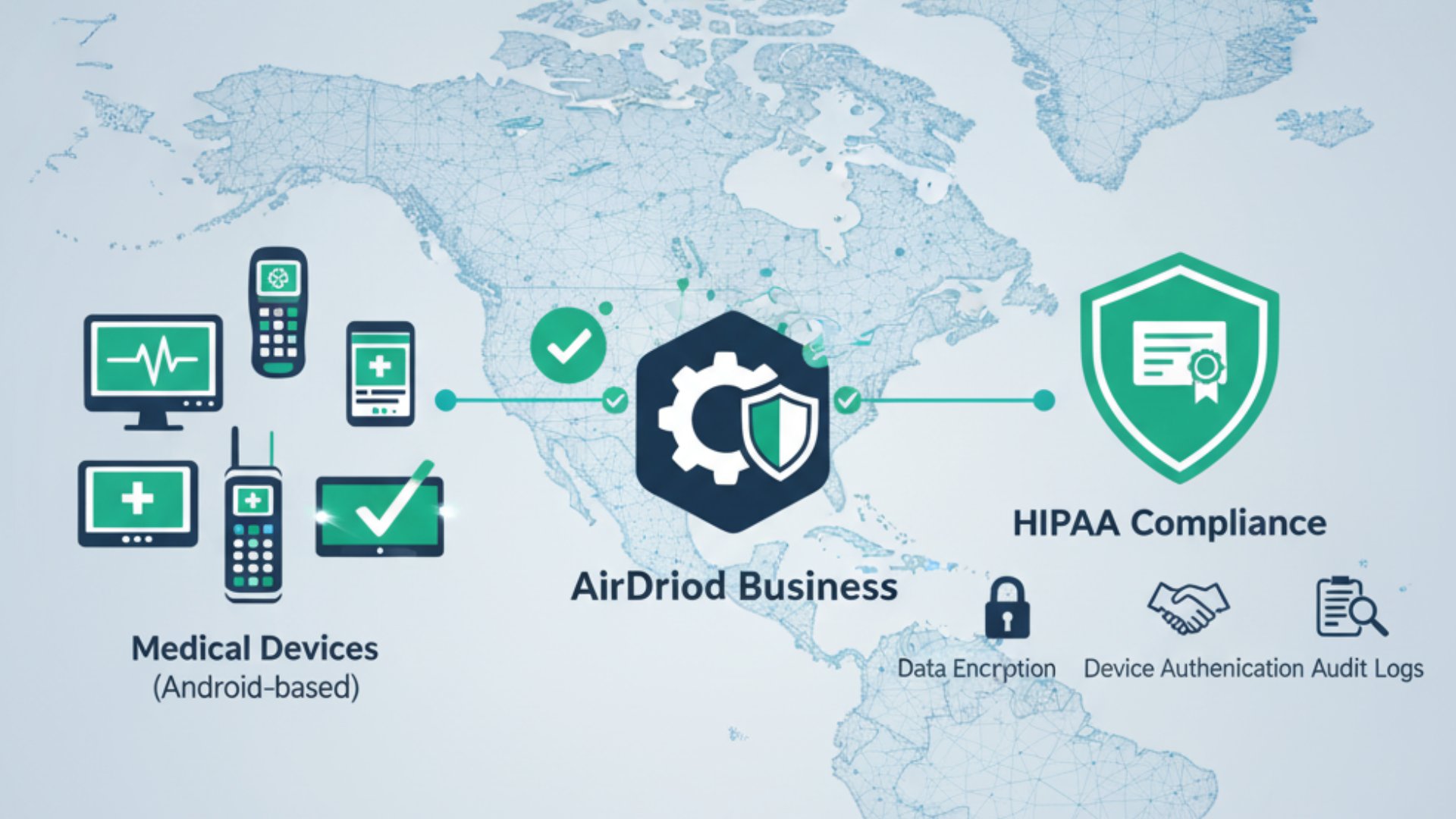Case Study: Medical Device Manufacturer Easily Passes HIPAA Compliance Audit by Centralizing Certificate Deployment with AirDroid Business
In the healthcare industry, HIPAA (Health Insurance Portability and Accountability Act) imposes stringent requirements on the authentication, encryption, and auditability of patient data. This is particularly true for medical device manufacturers, whose monitors and portable diagnostic devices connect to hospital intranets to transmit patient data. Managing the certificates for each device directly impacts compliance.
This case study explains how one medical device manufacturer used AirDroid Business to address the challenges of managing certificates for distributed devices, achieving a single-pass HIPAA compliance audit and developing reusable practical experience.

- 1 : Case Background and Core Challenges of HIPAA Compliance
- 2 : Solution: AirDroid Business specifically addresses HIPAA compliance pain points
- 3 : Compliance results: Pass HIPAA audits on the first try, balancing efficiency and security
- 4 : Relatable Success Stories: A Practical Guide to HIPAA Compliance for Medical Device Manufacturers
Case Background and Core Challenges of HIPAA Compliance
This medical device manufacturer specializes in developing Android-based portable medical devices (such as mobile monitors and bedside diagnostic instruments). Its products are distributed to over 200 hospitals in North America. The manufacturer must meet both the "pre-installed compliance certificate" requirement and the "remaining validity of the certificate while in hospital use" requirement. Its HIPAA compliance challenges are concentrated in three key areas:
Company Overview: Dual Pressures from Fragmented Equipment and Compliance Requirements
- 1. Device Scale: Annual production of over 5,000 Android medical devices, requiring pre-installed SSL certificates (for encrypting patient data transmission) before shipment. Furthermore, the hospital needs to remotely manage the certificate lifecycle (renewal and revocation) for over 1,000 devices currently deployed.
- 2. Core HIPAA requirements: ensuring each device's "identity is verifiable" (only authorized devices access the hospital network), "data is encrypted" (transmitted data such as heart rates and diagnostic reports are not leaked), and "operation traceability" (certificate deployment and update records are auditable).
Compliance Pain Points: Four Dilemmas of Traditional Manual Certificate Management
The company faces four main types of challenges when it comes to compliance. The traditional, manual certificate management practices worsen the scenario by lacking standardized methodology.
Pain Point 1: Substandard device authentication violates HIPAA "access control" requirements
HIPAA requires that only authorized devices access patient data. However, under the traditional model:
- 1. Manually pre-installing certificates can result in multiple devices using the same certificate, making it impossible to distinguish device identities;
- 2. If a hospital device is lost, manual notification to IT is required to revoke the certificate, with an average response time exceeding 24 hours, posing a risk of data leakage.
Pain Point 2: Inconsistent data encryption does not meet "transmission security" specifications
HIPAA mandates full encryption of patient data transmission, but traditional processes have vulnerabilities:
- 1. Some devices' certificates expired and were not updated promptly, resulting in data transmission interruptions and requiring manual reinstallation by hospital IT, impacting diagnosis and treatment.
- 2. Certificate deployment relies on manual processes, leading to omissions and errors. For example, a batch of 50 monitors was returned to the hospital for rectification due to incorrect certificate configuration.
Pain Point 3: Lack of audit logs, unable to meet "traceability" requirements
HIPAA audits require "certificate operation records for each device" (e.g., who pre-installed it, when it was updated, and whether it was revoked). Traditionally:
- 1. Certificate operation records are scattered across Excel spreadsheets and production logs, making them difficult to export and requiring 3-5 days of manual compilation during audits;
- 2. Some hospitals have reported "missing device certificate update records," posing a potential risk to compliance audits.
Pain Point 4: High IT O&M costs and difficulty in scalable management
As the number of devices grew, traditional manual management efficiency plummeted:
- 1. Pre-installing certificates for the first 500 devices required three IT staff members a week;
- 2. Renewing certificates for the hospital's existing devices required remote guidance from medical staff on a device-by-device basis, resulting in the IT team spending over 40 hours per month dealing with certificate issues.
Streamline Compliance with AirDroid Business
Tired of manual certificate management? AirDroid Business automates the process, addressing HIPAA compliance pain points effortlessly.
Solution: AirDroid Business specifically addresses HIPAA compliance pain points
After comparing various options, the company chose AirDroid Business as its MDM tool. The key reasons were its three key features: "deep adaptation for Android devices," "full automation of the certificate process," and "visualized audit logs," which perfectly matched the compliance requirements of medical devices.
Selection Logic: Why Choose AirDroid Business Over Traditional PKI Systems?
- 1. Android-specific adaptation: All enterprise devices are Android-based, and AirDroid Business supports all versions of Android 5.0 and above. This provides deep control over device certificate permissions (e.g., prohibiting manual certificate deletion), surpassing the "shallow adaptation" of general-purpose tools for multiple operating systems.
- 2. Lightweight deployment: No need to set up a complex PKI server. Connecting with a CA (Medical Certificate Authority) is completed within one day of account registration, significantly reducing compliance preparation time compared to the two-week deployment cycle of traditional systems.
- 3. Manageable costs: With a per-device fee (less than 100 RMB per Android device per year), and no hidden module fees, the annual budget for 5,000 devices is only 500,000 RMB, far less than the 2 million or more RMB investment of traditional PKI systems.
Core Implementation Strategy: Anchoring HIPAA Compliance Key Points with “Automated Certificate Management”
Below is an account of how automated certificate management helps solve the above issues through standardized strategies.
Strategy 1: Automating certificate lifecycle management to meet "data encryption + authentication" requirements
Pre-installed before shipment: By pre-setting medical-specific certificate templates and the SCEP automation protocol, unique certificates can be pre-installed in batches for each device leaving the factory, ensuring "one device, one certificate" and eliminating identity reuse at the source.
At the same time, the device serial number and certificate information are automatically associated to form an unalterable identity binding relationship.
In-use device management: Differentiated renewal rules are set for the hospital's deployed devices (such as renewing high-priority monitors 60 days in advance). Certificate updates are performed silently in the background throughout the process, without the need for medical staff intervention. When a device is lost or scrapped, remote triggering of certificate revocation is supported, significantly shortening the security response window.
Strategy 2: Automatic log generation + visual export to meet the "audit traceability" requirements
AirDroid Business automatically records all certificate operations, generating structured logs that comply with HIPAA audit standards:
- 1. Logs cover core dimensions such as "operation subject, time, device information, and certificate status changes," eliminating the need for manual entry.
- 2. Reports can be exported in PDF/Excel format based on audit requirements, serving as compliance documentation and eliminating the manual compilation costs of traditional models.
- 3. Read-only access to logs is provided to partner hospitals, facilitating simultaneous verification of device compliance and reducing cross-institutional communication costs.
Strategy 3: Device permission control to strengthen "data security" protection
To address HIPAA's stringent data security requirements, AirDroid Business restricts the use of device certificates:
- 1. End users are prohibited from manually deleting or modifying certificates to prevent encryption failure caused by accidental operations;
- 2. Certificates are limited to patient data transmission scenarios, preventing unauthorized network access and reducing the risk of certificate abuse.
Automate Your Certificate Management with AirDroid Business
Discover how AirDroid Business simplifies certificate lifecycle management, ensuring data security and compliance with ease.
Compliance results: Pass HIPAA audits on the first try, balancing efficiency and security
Six months after implementing AirDroid Business, the company achieved significant results in HIPAA compliance audits and operational efficiency. Its core value is reflected in "zero audit issues + cost reduction + controllable risks":
Compliance audit: passed in one go, with no non-compliance items
Audit Results: The HIPAA audit team focused on three key areas: device authentication, data encryption, and log traceability. All of the company's 6,000+ devices (factory and in-use) met these requirements, resulting in a single-pass audit with no corrective actions required.
Audit Efficiency: Because logs were exported in advance via AirDroid and categorized according to audit requirements, the audit duration was shortened from the expected five days to two, reducing the company's coordination costs.
Operation and maintenance efficiency: IT workload reduced by 70%, and large-scale management implemented
Factory pre-installation efficiency: Certificate pre-installation time for 500 devices has been reduced from one week to eight hours, eliminating the need for manual device-by-device operation.
In-use device management: Certificate renewal and revocation are now automated, reducing the IT team's monthly certificate issue processing time from 40 hours to 12 hours, freeing them to focus on core tasks such as device development.
Device failure rate: Device failures due to expired or incorrectly installed certificates have dropped from 15 per month to zero, resulting in a 90% reduction in hospital complaints.
Security Risks: Data Leakage Risks Reduced to Zero, Hospital Trust Enhanced
- 1. The response time for certificate revocation after a device loss has been reduced from 24 hours to 0.5 hours, and no data breaches have occurred due to unrevoked certificates.
- 2. Over 50 new partner hospitals have been added in North America, and customer surveys indicate that compliance capabilities are a key factor in partner decisions.
Relatable Success Stories: A Practical Guide to HIPAA Compliance for Medical Device Manufacturers
The company's practice provides a clear compliance path for similar medical device manufacturers. The core experience can be summarized in three points:
Give priority to "Android-specific MDM" to avoid adaptation vulnerabilities
Most medical devices use customized Android systems, and general MDM systems are prone to problems such as "insufficient certificate permission control and silent deployment failures." We recommend prioritizing Android-based tools such as AirDroid Business to ensure seamless compatibility between certificate management and device systems.
Using “automation” to solve compliance pain points and reduce manual intervention
The core risk points of HIPAA audits often stem from "human operational errors" (such as missing certificates and missing logs). Automating the entire certificate lifecycle through MDM can not only reduce the error rate, but also alleviate the problem of "incomplete manual records" during audits.
Open up the "CA - Device - Audit Log" link in advance to reduce compliance costs
It is recommended that during the compliance preparation phase, MDM be used to connect to a dedicated medical CA and ensure that certificate operation logs are synchronized in real time and can be exported. This eliminates the need for temporary data organization before an audit, enabling "audit-ready at any time, pass-once."
Conclusion: AirDroid Business Becomes a HIPAA Compliance Accelerator for Medical Device Manufacturers
For medical device manufacturers, HIPAA compliance isn't a one-time task; it's an ongoing process of device lifecycle management. AirDroid Business, leveraging its deep Android compatibility, high automation, and manageable costs, not only helped the company easily pass audits but also built a scalable, low-risk compliance system.
As medical devices become increasingly intelligent, these lightweight, scenario-based MDM tools will become a key choice for compliance management in the healthcare industry.
Enhance Your Compliance Strategy with AirDroid Business
Make HIPAA compliance effortless with AirDroid Business. Our solution offers deep Android compatibility and automation for peace of mind.







Leave a Reply.